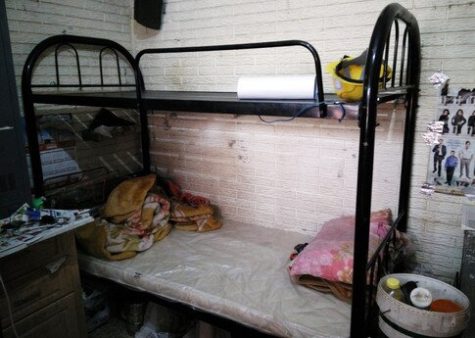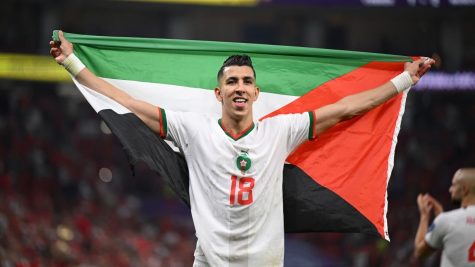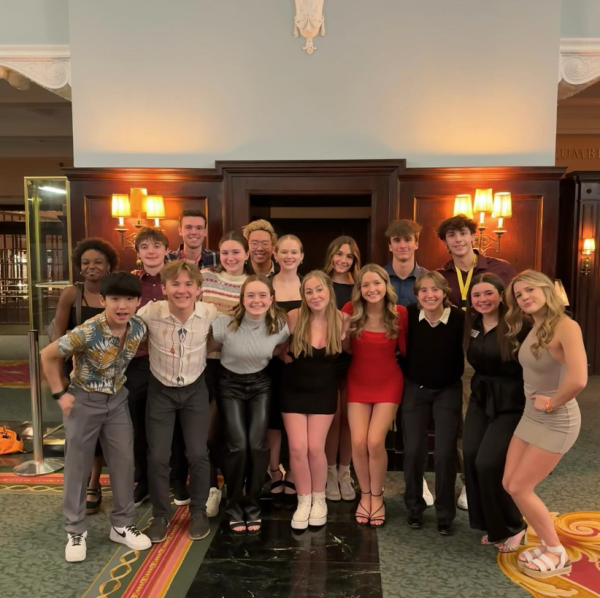How Qatar’s Human Rights Abuses Overshadow the World Cup

Justin Setterfield/Getty Images/New York Times
The World Cup opening ceremony at Al Bayt Stadium in Qatar on November 20th.
The International Federation of Association Football (FIFA) World Cup is a football competition between the national men’s teams from countries that are a part of the association. The tournament is the most prestigious in the world, and teams compete at grand venues in the host nation(s) for around a month to fight for the title. This year, the World Cup was hosted in Qatar, making it the first Middle Eastern country to host this event. Despite this, Qatar has faced backlash for its treatment of and lack of protection for the human rights of migrant workers, women, people in the LGBTQIA+ community, and journalists.
When Qatar was first selected as the host country for the 2022 World Cup in 2010, it did not have sustainable infrastructure to house both the competing teams and the fans, so this required millions of migrant workers to build and service these facilities.
According to the Human Rights Watch organization, both FIFA and Qatar contributed to the abuse of these migrant workers, broke laws, and did not listen to the workers or other civil rights groups when warned of the likely consequences that would come from this negligence.
“(FIFA) became a complacent enabler to the widespread abuse workers suffered, including illegal recruitment fees, wage theft, injuries, and deaths,” said Human Rights Watch.

Other issues that arose, as brought up by the Amnesty International movement, were that workers had terrible living conditions, were lied to about their salaries (which were often delayed), did not have residence permits that would allow them to legally travel outside of their working area, had their passports taken from them and were threatened if they wanted to leave Qatar, were continually threatened if they asked for help, and some were forced into labor.
In Qatar, women are also being treated poorly and unfairly in relation to their male counterparts. Human Rights Watch goes on to report that women in Qatar who make sexual or physical assault accusations are typically ignored or silenced by the man’s accounts.
“FIFA has been assured that women reporting rape or other forms of abuse will not face any questions or accusations regarding possible consensual extramarital sexual relationships and should not fear repercussions of any form on that basis,” said FIFA about ameliorating this issue during the World Cup.
However, writer Jacob Whitehead of The Athletic disproved these positive prospects, claiming victims were being accused of extra-marital sex, an action punishable by imprisonment or even flogging if they are Muslim, which breaks international human-rights law. This was particularly an issue during the World Cup, since the frequency of this violence and risk of it occurring increased.
LGBT people have also been a huge target in Qatar for similar treatment. In Qatar, same-sex relationships and activity is punishable by imprisonment and potentially even the death penalty, which is supported by Human Rights Watch and The Washington Post. Human Rights Watch also explained that while in prison, these people are often subjected to beatings and sexual harassment.
In regards to the World Cup, Leo Sands of The Washington Post reported some teams wanted to show their support for LGBT fans. In response, FIFA continued to perpetuate negative stigmas and worked to push back against this by threatening a penalty for any players who chose to wear OneLove rainbow armbands in allyship of the LGBTQIA+ community.
Similarly to how FIFA insisted that women would be respected and protected, they also claimed that all fans were welcome to the World Cup, including LGBT fans. However, their hypocrisy shined through when they reportedly refused to allow multiple fans wearing rainbow-themed attire into stadiums, once again not following through with their promises .
“Khalid Salman, a former Qatari soccer player and official ambassador for this year’s tournament, told German television in an interview published this month that homosexuality is ‘damage in the mind,’” said Sands.
Because of these conservative sentiments Qatar openly projects, and their lack of consideration for LGBT citizens and fans alike, the World Cup was unable to be properly enjoyed by everyone and rather instigated an environment for hatred and prejudice.
Finally, a contributing factor to what was preventing these issues from being addressed, or even being known, is that Qatar penalized journalists for violating their restrictions on free speech.
“Qatar’s penal code criminalizes criticizing the emir, insulting Qatar’s flag, defaming religion, including blasphemy, and inciting ‘to overthrow the regime’. . . Some international journalists have been detained while reporting in Qatar, forced to confess, and their work has been destroyed,” said Human Rights Watch.

Because of this, accurate information has been difficult to retrieve and facilitate, especially for foreign journalists who were not familiar with Qatar’s laws and who were more prominent during the World Cup. This also ties back to the suppression of the LGBTQIA+ community in Qatar, as The Guardian stated that American journalist Grant Wahl was restrained by World Cup security for wearing a rainbow shirt. Other reporters have also experienced prejudice, including Israeli journalists. According to Jerusalem correspondent and writer for CNN, Hadas Gold, Arab fans in Qatar have been quite hostile to Israeli journalists: refusing interviews, yelling, taunting, threatening, etc.
As a result of these mistreatments of journalists, free speech and the press could be at risk, not only in Qatar, but in other future World Cup host nations.
In order for all of these issues to be properly addressed and managed, it will be necessary for Qatar, in conjunction with FIFA, to take responsibility for the role they have played in encouraging and allowing these mistreatments to occur. Although Qatar may have their own laws, whether or not they differ from the rest of the world’s, to host such a widespread event like the World Cup, they may need to make adjustments so that all visitors, workers, and journalists feel welcome and safe.









